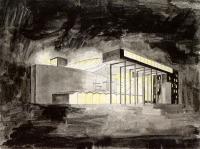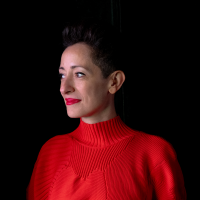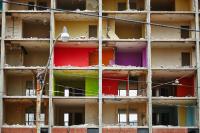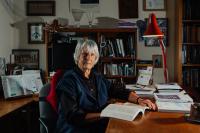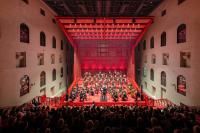Wohnhaus Reichenbachstraße
Munich, Germany
In Munich’s city centre, the district around the “Gärtnerplatz”, considered one of the most important town expansions of the 19th century, is now a protected ensemble. It is, at the same time, a centre of modern urban living. The refurbishment of the building at n° 20, Reichenbachstrasse will therefore also be governed by the keen balance between historical heritage and the present.The original neoclassical facade had been irretrievably destroyed by structural interventions. Yet it is not the basically impossible reconstruction of the original streetscape – historical sources are not available – but the architectural reinterpretation which underpins the refurbishment concept.
The facade, which is divided into three parts, picks up on a design element – rusticated blocks – quite common in its day and estranges it at the same time: The jutting elements – made of plaster in this case – have different heights, thus forming a wavelike relief. This structure on the facade creates a differentiated and impressive interplay of shadows, depending on perspective and position of the sun. The essentially antique-style heaviness of the rusticated blocks enters into a charming contrast to the liveliness of the atmospheres created by the light. The playful handling of contrasting design elements and the characterising wave motive are continued in the quiet courtyard. Organically formed balconies, intelligently staggered on each storey, run along the whole breadth of the building and create a play of narrowness and vastness, privacy and openness. They are accessed by room-high French doors, which contribute greatly to the lighting in the apartments.
In the interior, the existing bourgeois room partitioning will be largely kept. In some cases the lighting will be improved by creating new and generous openings between the rooms. The combination of impressive room heights, modern stucco on ceilings and walls, elegant herringbone parquet floors and distinguished double doors create the impression of a “contemporary old building”. In line with environmental sustainability, a solar thermal system provides a large part of the power required for warm water in the building.
- Architects
- Hild und K
- Location
- Reichenbachstraße, 80469 Munich, Germany
- Year
- 2011
- Client
- Euroboden GmbH und Co. Projekt KG
- Team
- Andreas Hild, Dionys Ottl, Beate Brosig, Sebastian Klich, (Andrea Sommer), Horst Dehnicke, Julianna Eger, Andreas Held, Peter Hellauer, Antonia Seubert







